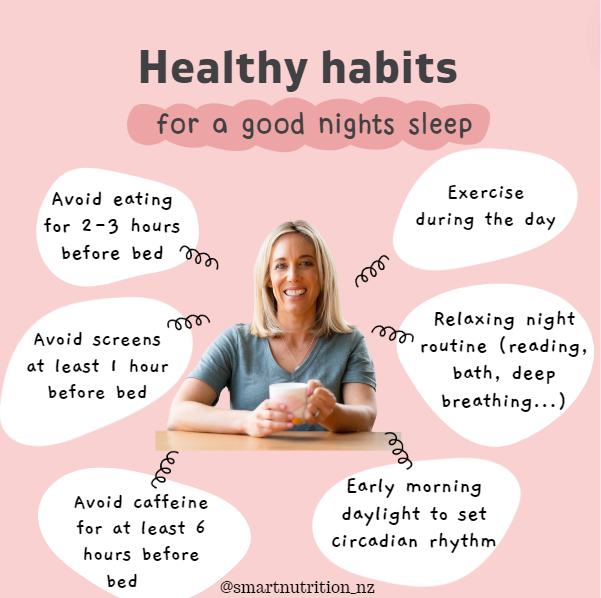
Setting yourself up for a good nights sleep is crucial for your health and wellbeing! Sleep is important for concentration, energy levels, immune function, gut health, appetite regulation, stress management, and so much more.
Sleep has a significant affect on your mental health, physical health, and wellbeing. It is a cornerstone to your health. The aim should be to get 7-9 hours of sleep per night, but te quality of your sleep matters too!
To make sure you’re getting enough sleep, work backwards from the time you need to wake up to when you need to go to bed, and when you need to start your bedtime routine.
Tips for a good nights sleep…
- Getting early morning daylight helps your body set your circadian rhythm (sleep/ wake cycle), which makes it easier to to to sleep AND what a lovely way to start your day!
- Exercise during the day will improve your sleep quaity and duration, as well as providing lots of other benefits for your health, metabolism, and mood!
- Caffeine is a stimulant and suppresses the production of a hormone that makes you feel sleepy. It takes 5-6 hours for your body to clear half the amount of caffeine you consume. So I recommend limiting your caffeine intake to no more than 2 coffees per day & no more than 4 caffeinated teas. Avoid all caffeinated beverages for at least 6 hours (depending on your sensitivity potentially 8-10 hours) before going to bed. If you are a coffee fan, keep it as a morning thing.
- Finish eatign for the day 2-3 hours before going to bed. This ensures your body is not busy digesting your food when you are trying to sleep. This is also very important if you are prone to reflux/ indigestion.
- I think you are probably all aware of the importance of avoiding screens before bed, but make sure you do set your phone to sleep mode 1 hour before bedtime as a reminder.
- Factor in some time at the end of your day for winding down, clearing your head, and preparing to sleep. For example, have a warm bath, read for 30 minutes, or, if you’re feeling extra stressed, practice deep diaphragmic breathing to move your body from a state of stress to a state of rest.
